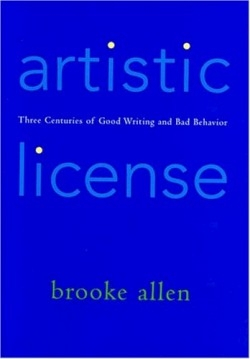Artistic License
Three Centuries of Good Writing and Bad Behavior
This book belongs to an earlier generation of literary criticism, one that is too often undervalued today. The author takes as her intellectual foundation that “writers’ lives are not always particularly interesting; knowledge of them does not necessarily add to one’s enjoyment of the work. In some cases, though, such knowledge does enrich our understanding.” Allen enjoys writing about authors, the far-too-human people behind the literary icons, and she does so with elegance and understanding.
The eighteen essays in this collection are each devoted to a single author, arranged chronologically. Allen displays a marked preference for those who are dismissed as “dead white males” by many contemporary literary scholars: Samuel Pepys, James Boswell, William Makepeace Thackery, Henry James, Sinclair Lewis, et. al. Among her lesser-known subjects are L. Frank Baum, author of the Wizard of Oz books, and G.A. Henty, a nineteenth-century author of dozens of historical adventure novels for boys (Allen notes, “it goes without saying that no writer today would get away with this sort of gender stereotyping”) whose works have once again found favor.
These essays were all previously published, mostly as reviews of author biographies. They are not model book reviews, however: Allen is far more interested in conveying her own thoughts about the subject of the biography than in evaluating the biographer’s efforts. Take, for example, her piece on Lawrence Sterne, ostensibly a review of Ian Campbell Ross’s 2001 biography, Lawrence Sterne: A Life. In fourteen pages, Ross and his book are mentioned exactly once: “his [Sterne’s] story, written with sympathy and elegance but without much wit or spark by Ian Campbell Ross, makes for rather sad reading.” Ross and his 500-page effort are dismissed in less than a sentence.
Allen holds a Ph.D from Columbia University, and has worked as managing editor of literary quarterlies. Her criticism has appeared frequently in the New York Times Book Review, the Atlantic Monthly, and The New Criterion. Her first book of essays, Twentieth-Century Attitudes, was selected as a New York Times Notable Book of the Year.
She is a very talented writer who obviously respects and admires the authors she writes about for their accomplishments, even when, as she claims was the case with Lord Byron, “he was one of the great shits of history.” After completing a chapter, the reader is torn between reading the next chapter and putting aside Allen’s book to pull out a novel by Sterne or James or whoever was her most recent subject. In an age when many scholars feel that literary theory is more important than literature itself, Allen’s obvious love of literature and those who create it is refreshing.
Reviewed by
Erik Bledsoe
Disclosure: This article is not an endorsement, but a review. The publisher of this book provided free copies of the book to have their book reviewed by a professional reviewer. No fee was paid by the publisher for this review. Foreword Reviews only recommends books that we love. Foreword Magazine, Inc. is disclosing this in accordance with the Federal Trade Commission’s 16 CFR, Part 255.

